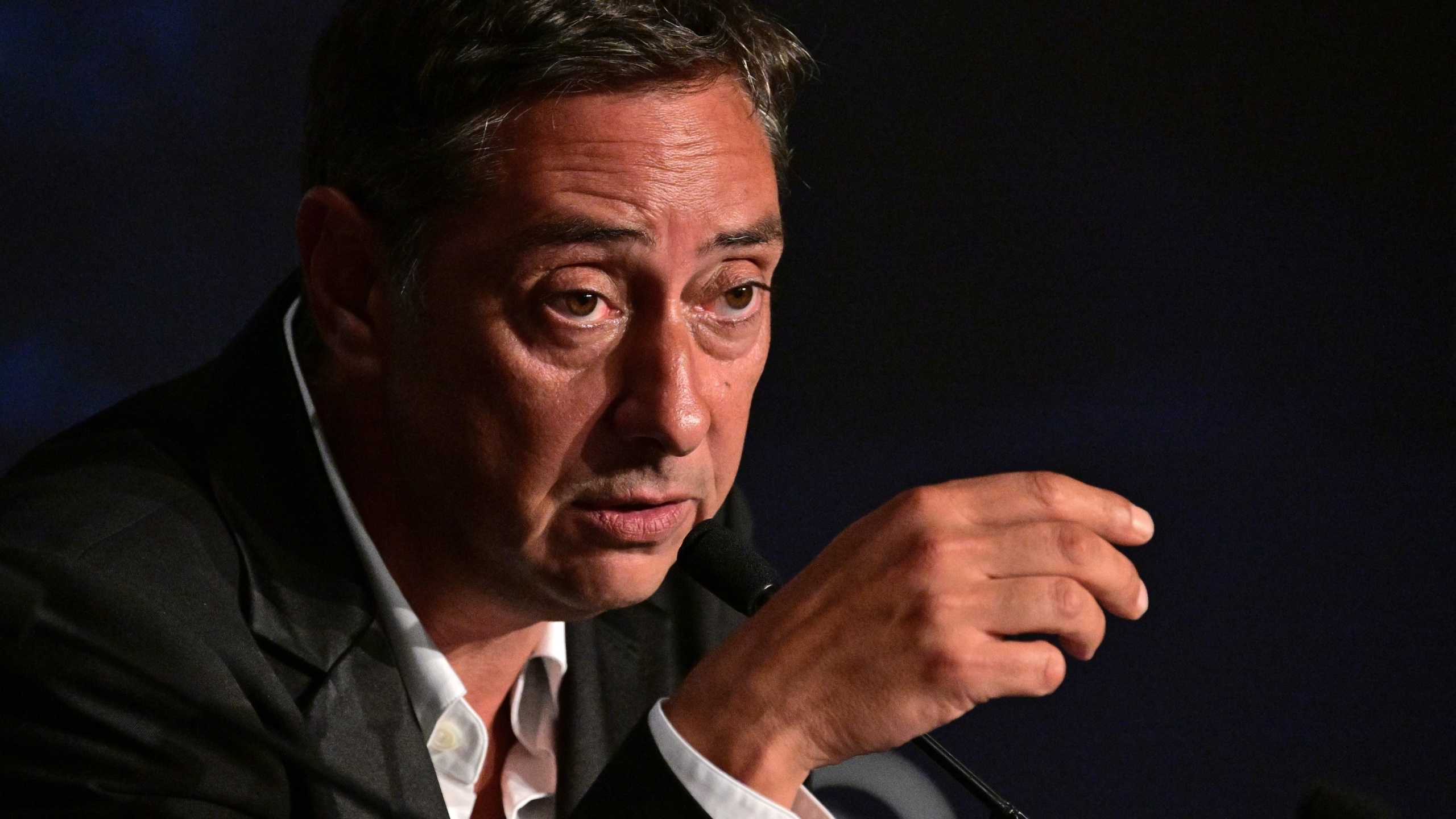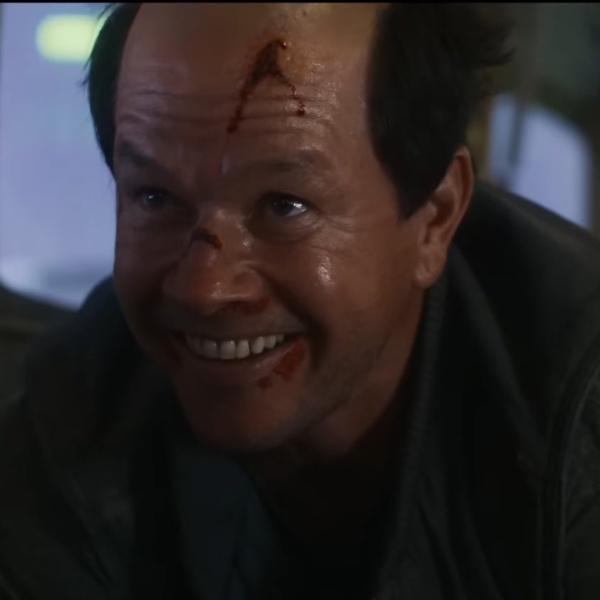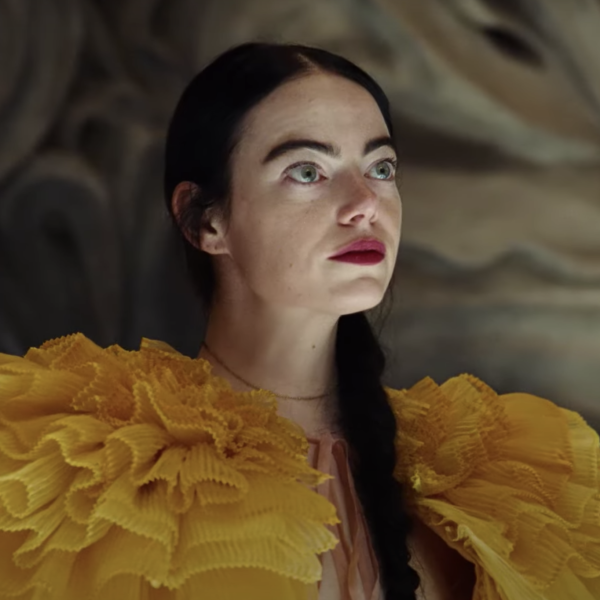Miguel Gomes does not consider himself a genius like Alfred Hitchcock.
The 55-year-old Portuguese director’s ravishing, cross-continental, mostly B&W feature “Grand Tour” — a mix of drama and ethnology — won him the Best Director award at Cannes back in May and is now Portugal’s Oscar submission to the 2025 Oscars. According to Gomes, unlike Hitchcock, he cannot sit around a room and dictate innovative ideas for story arcs and shots.
Speaking with IndieWire at the Sunset Marquis in West Hollywood, in his first time in L.A. and on the first stop of his Oscars press tour amid the film’s upcoming release in France and Italy, the gracious, soft-voiced, sharp-eared Gomes said, “I have, in my case, to open the window, let the world come in, and react to it.” Cigarette puffs later, he said, “I have to catch butterflies.”
It’s fascinating to hear a modern master — whose previous films “Tabu” (2012) and the six-hour tripartite “Arabian Nights” (2015) won him recognition at the Berlin Film Festival and on the Cahiers du Cinéma top 10 — talk about flexing his relatively limited directorial skills. If anything, Gomes’s own approach to story structure is highly rigorous, what he describes as an unpredictable arrangement of “intellectual,” “mechanical,” and “organic” processes, and what one critic describes as “seemingly reckless but actually deceptively meticulous.”
“Grand Tour” follows British civil servant Edward (Gonçalo Waddington) in 1918 as he plays hopscotch from Rangoon to Singapore, Bangkok to Saigon, Osaka to Shanghai — cities that were actual stops in a popular colonial-era travel package for Europeans wanting to become enlightened about the exotic Orient. Edward is actually running away from his fiancée Molly (Crista Alfaiate), in hot pursuit, and always one metropolis behind. The film has an unadvertised two-part structure similar to “Tabu”: the first half follows “cowardly” Edward, while the second shifts to “stubborn” Molly.
What’s stunning, and initially hard to fathom, is that Gomes splices studio-created scenes of Edward and Molly’s early 20th-century tragicomic romance with contemporary footage of people, sights, and spellbinding cultural performances in those Asian cities. Gomes and one of the film’s three cinematographers, the legendary Thai lenser Sayombhu Mukdeeprom (“Challengers,” “Syndromes and a Century”), captured the footage while embarking on the same grand tour in early 2020, before the script was even written.

“Only after doing this trip and filming the things we wanted to film, we returned to Lisbon to write the story, in reaction to these images,” said Gomes. While the general inspiration for the main characters arrived when he was reading English playwright-novelist W. Somerset Maugham’s 1930 book “The Gentleman in the Parlour,” the fleshed-out conceptions of Edward and Molly didn’t materialize until later.
Thus the response to the footage by the film’s “central committee” (consisting of screenwriters Gomes, Mariana Ricardo, Telmo Churro, and Maureen Fazendeiro), subsequent script-writing, dressing of sound stages to mimic a fake 1930s Hollywood version of Asia, and “principal” photography with the cast all happened during the pandemic — and after Gomes had completed the physical tour. In fact, Gomes had to shoot the Shanghai portion of the contemporary footage remotely from an Airbnb in Portugal, since he and Mukdeeprom were not allowed to enter China in February 2020 as the country had entered a lockdown. This presented Gomes with the challenge of directing a dedicated Chinese crew as they hustled along 3,000 kilometers of the River Yangtze, with Gomes instructing over a live feed across a maze of monitors.
Gomes attributes his ability to continually experiment with radical filmmaking methods in part to his identity as a Portuguese filmmaker. “I think I’m really attached to Portuguese cinema,” which he said has a unique identity and history. “Portugal doesn’t have a film industry. Because of the economical context, we don’t have a big market. This is bad in itself. On the other hand, it allows Portuguese cinema to escape a little bit from the tyranny of the industry, saying you have to shoot with this actor or shoot the film this way.” Gomes appreciates that he, along with legends such as the late Manoel de Oliveira who was prolific well past 100, and contemporaries such as Pedro Costa (“Vitalina Varela”), “can afford a certain degree of freedom because there are no big expectations. So lots of Portuguese films are quite peculiar, and they look like prototypes. They are not coming from a factory line. So in a way, if you have a certain talent, you can make very personal films that don’t look like any other films.”
The distinctiveness of Portuguese filmmaking shows up even in collaboration with experienced DPs such as Mukdeeprom. When I asked Gomes if it was helpful having the eyes of a Thai DP on the actual Asian tour, he shrugged. Roles on his set are rather fixed.

“I understand it’s not the same even in France or even here in the States, but in Portugal, it is the director’s job to frame and to choose the lens, it is the cinematographer’s job to make the light.” Thus on the Asian trip, Gomes responded to (“glimpses of beauty and grace, comical stuff or something that would touch me”) became the film’s “found footage,” a term I introduced that he readily latched onto. Of course, it helped that he and Mukdeeprom, after having worked for over a year on “Arabian Nights,” share a certain “telepathy” (winking to “Queer,” which Mukdeeprom shot for Luca Guadagnino).
The script for “Grand Tour” was also very “strange.” Some pages were only stills from the found footage from the Asian journey. Other pages were normal descriptions, say a cut to an exterior day scene of Edward walking on the pier in Rangoon. Gomes admitted that the writing process, consisting of responding to images, “can be a little scary, like being on the sea but not knowing where the wind blows.”
When I mention the tension between the colonial and postcolonial ways of interpreting the film’s past/future latticework, its gaze, and its white characters’ Western privilege, Gomes’s posture slightly shifts. He has heard this objection before.
“It’s a mystery to me why people tend to think that what characters express is what the film is trying to express. This [distinction] is something that was always very clear but nowadays looks less clear for reasons I don’t get. Fiction is always created by the friction between characters that do something that can be ethically, socially, or politically wrong. Just until some years ago, there was no problem doing this. It was even one of the most interesting ways to let the viewer understand this by himself.”
He continues, “Another thing I like to explore is the ambiguity when people don’t know what to think. I think that’s interesting because this means I’m not making a propaganda film, which is one in which there is no doubt what view the film has. It is always better to let people think for themselves than just to preach to them.”
Gomes says that some people have told him that the film is not strong enough to be a denouncement of colonialism, whereas others think it is a smart way to criticize it. He adds jokingly, “As for me, I don’t want to colonize nothing, I am sure about that.”
When I bring up how he often frames Edward and Molly equally alongside their guides in Asia, or how the deployment of multilingual narration might speak to the film’s subversive project, Gomes agreed. “There’s a political meaning in having the voiceover be in different Asian languages. Just as there’s a political meaning in these British characters not speaking English, but Portuguese. There are lots of things that have political weight, but you have to be in a good mood to see these things, because I will not push them on anyone.”
Ending on a lighter note, I ask Gomes about the seeming running theme about cowardly men and stubborn women in his work. His 2012 film “Tabu” begins a story of a couple in Africa, the dead wife and the depressed husband, which he calls “silly, and romantic in an excessive way.” Turns out that the similar story he chanced upon in Somerset Maugham’s book, which became the basis of the Edward-Molly saga, was on the eve of his marriage.
“I don’t think I have an issue with matrimony. I proposed to my wife at the ‘Arabian Nights’ party at Cannes in 2015. I was a bit drunk. The next day, we woke up and read a short article in the French newspaper “Libération” about a proposal at a Cannes party. And we said, oh my god! My wife, Maureen, said her father reads this newspaper so I have to tell him right away! Later, I read her the Maugham story, and we laughed. I don’t know if I am cowardly as Edward, at least I didn’t run away from my marriage. And what is strangest, neither has she!”
“Molly even looks a little bit like her,” he said. The film is dedicated to Maureen.
“Grand Tour” is the Portuguese submission for the 2025 Best International Feature Film Oscar. MUBI will release the film in 2025.





